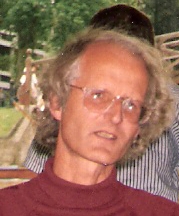Sjur Refsdal

Sjur Refsdal (30 December 1935 – 29 January 2009) was a Norwegian astrophysicist, born in Oslo. He is best known for his pioneer work on gravitational lensing, including the Chang-Refsdal lens.
Biography
In 1970 he earned a doctorate at the Institute of Theoretical Astrophysics, University of Oslo. Later that year he became professor in astrophysics at the Hamburg Observatory[1] in Germany, and remained in that position until he retired in 2001.
In 1964 and 1966 he published a series of articles on the effects and possible applications of gravitational lenses.[2] He is particularly known for the "Refsdal Method", which describes how one may estimate the expansion rate of the Universe (Hubble constant) using the measured time-delay and lens properties of a gravitationally lensed Supernova (SN).[3] This method was applied for the first time in 2018,[4] with the homonymous SN Refsdal. He later started work on stellar evolution, but returned to gravitational lensing shortly before the first detection of a gravitational lens, dubbed the Twin Quasar.
He was a member of the Norwegian Academy of Science and Emeritus at the Institute for theoretical Astrophysics at the University of Oslo.[5] On 1 February 2005 he was awarded the King's Medal of Merit in gold.
The first detected multiply-lensed supernova was nicknamed "SN Refsdal" in his honor.[6][7]
References
- ^ Obituary, Hamburg Observatory
- ^ P. Schneider, J. Ehlers, E.E. Falco, Gravitational Lenses, Springer-Verlag, Berlin 1999. Chapter The period 1963-1979 at Google Books
- ^ Sjur Refsdal (1964). "On the possibility of determining Hubble's parameter and the masses of galaxies from the gravitational lens effect". Monthly Notices of the Royal Astronomical Society. 128 (4): 307–310. Bibcode:1964MNRAS.128..307R. doi:10.1093/mnras/128.4.307.
- ^ Vega-Ferrero (2018). "The Hubble Constant from SN Refsdal". The Astrophysical Journal. 31 (853): L31. arXiv:1712.05800. Bibcode:2018ApJ...853L..31V. doi:10.3847/2041-8213/aaa95f. S2CID 119483238.
{{cite journal}}: CS1 maint: unflagged free DOI (link) - ^ Obituary Archived 2009-03-03 at the Wayback Machine, Institutt for Teoretisk Astrofysikk, 2. February 2009
- ^ Kelly, P. L.; et al. (2015). "Multiple images of a highly magnified supernova formed by an early-type cluster galaxy lens". Science. 347 (6226): 1123–1126. arXiv:1411.6009. Bibcode:2015Sci...347.1123K. doi:10.1126/science.aaa3350. PMID 25745167. S2CID 206633888.
- ^ Overbye, Dennis (March 5, 2015). "Astronomers Observe Supernova and Find They're Watching Reruns". New York Times. Retrieved March 5, 2015.
